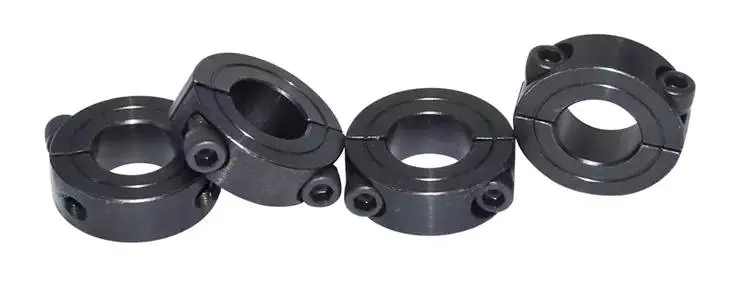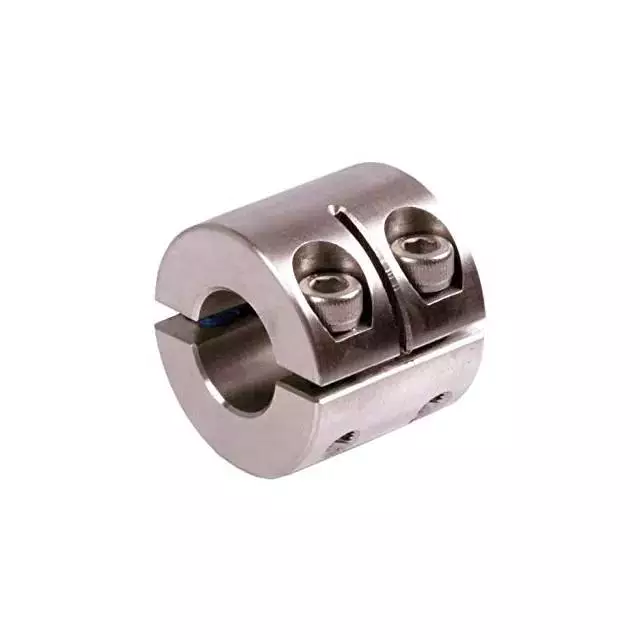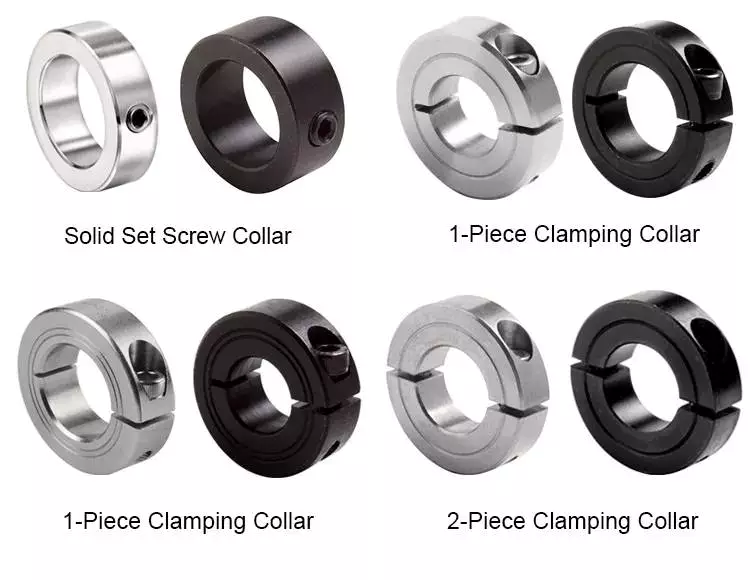Product Description
Custom Shaft Locking Collar 10mm/13mm/16mm/22mm Aluminium Split Ring Stop Collar Drill Bit Shank Depth Stop Metal Clamp Collars for Spline Shafts
Basic Information :
| Tolerance | 0.02~0.1mm. |
| Materials | Low, middle,high carbon steel / spring steel / Stainless steel 201, 301, 304, 316 / Aluminum / Brass / Bronze / Copper / Titanium / Plastic (PP, Nylon, PVC, APET) Brass or ABS,POM Ect And Customized raw material. |
| Surface Finish | Heat treatment / Polishing,Electronic Polishing / (Zinc, nickel, chrome, tin, brass, glod, silver, titanium) Plating / Electrophoresis / Black Oxide / Hot-dip galvanizing / Powder Coating / Paint Coating / Blasting / Shot Blasting / Bead Basting / Anodizing / Phosphating / PAD Printing / Laser etching / Dacromet Coating / Enamel. |
| Payment terms | Trade Assurance TT,paypal,Western Union,alipay,L/C. |
| Packing Detail |
Inner Packing: PE bag / EPE Foam Packing / Anti-Rust Paper Packing / Blister / SMT / Vacuum Packing / Plastic Box Packing / Color Box Packing. Outter Packing: Stretch Film Packing / Carton / Pallet / Wood Case. |
Our Advantage
-
Provide OEM/ODM service and assembling service, since 2000.
- One-stop purchasing service :Stamping part, CNC lathe part, CNC milling part, Springs, Shafts, fastener etc.
- The 2ndtier supplier of , factory audits passed.
- Product certification: RoHS, HE, vailable.
- Management certification: ISO/9001: 2015 and IATF16949 Passed.
| After-sales Service: | Custom Service |
|---|---|
| Warranty: | Custom Service |
| Condition: | New |
| Certification: | RoHS, ISO9001 |
| Standard: | DIN |
| Customized: | Customized |
| Samples: |
US$ 50/Piece
1 Piece(Min.Order) | |
|---|
| Customization: |
Available
| Customized Request |
|---|

What are the temperature and corrosion resistance properties of shaft collars?
The temperature and corrosion resistance properties of shaft collars vary depending on the materials they are made of. Different materials exhibit different levels of resistance to temperature extremes and corrosion. Here are some commonly used materials for shaft collars and their temperature and corrosion resistance properties:
- Steel: Steel shaft collars, particularly those made from stainless steel, offer excellent temperature and corrosion resistance properties. Stainless steel is known for its high strength, durability, and resistance to rust and corrosion. It can withstand a wide range of temperatures, from low cryogenic temperatures to high heat environments. Stainless steel shaft collars are often used in applications where exposure to moisture, chemicals, or harsh environments is a concern.
- Aluminum: Aluminum shaft collars have good temperature resistance properties and can handle moderate temperature ranges. They are lightweight and offer reasonable corrosion resistance. However, aluminum is not as corrosion-resistant as stainless steel and may be susceptible to certain chemicals or highly corrosive environments. Aluminum shaft collars are commonly used in applications where weight reduction is a priority, such as aerospace or automotive industries.
- Plastic: Plastic shaft collars, such as those made from nylon or acetal, have limited temperature resistance compared to steel or aluminum. They can typically handle moderate temperatures but may deform or degrade at higher temperatures. Plastic collars are not as resistant to corrosion as metal collars but can still offer good resistance to certain chemicals and environmental conditions. Plastic collars are often used in applications where weight, cost, or electrical insulation properties are important factors.
- Brass: Brass shaft collars offer good temperature resistance and moderate corrosion resistance. They can handle a range of temperatures and are often used in applications where a combination of durability, conductivity, and aesthetics is required. Brass collars may tarnish over time but can still maintain their functionality and structural integrity.
It is important to note that the temperature and corrosion resistance properties of shaft collars can also be influenced by factors such as the specific alloy composition, surface treatments, and environmental conditions they are exposed to. When selecting shaft collars for your application, it is crucial to consider the temperature range and potential exposure to corrosive substances or environments. Consulting with manufacturers, reviewing technical specifications, and considering industry standards or guidelines can help ensure that you choose shaft collars with appropriate temperature and corrosion resistance properties for your specific needs.

Where can I find information on the materials used in manufacturing shaft collars?
If you are looking for information on the materials used in manufacturing shaft collars, there are several sources where you can find relevant information. Here are some common resources to consider:
- Manufacturer Websites: Many manufacturers of shaft collars provide detailed information about the materials they use in their product specifications or technical datasheets. Visiting the websites of specific collar manufacturers and exploring their product documentation or resources section can help you find information about the materials used in their collars. This information may include the type of material (such as steel, stainless steel, aluminum, or plastic) and any specific properties or characteristics associated with the material.
- Product Catalogs and Brochures: Manufacturers often publish product catalogs or brochures that provide an overview of their collar offerings. These catalogs may include information about the materials used in manufacturing the collars. You can request catalogs from manufacturers directly or check their websites for downloadable versions. The catalogs may highlight the material properties and advantages of using specific materials for different applications.
- Material Databases: Online material databases or directories can be valuable resources for finding information about specific materials used in manufacturing shaft collars. These databases typically provide comprehensive information about various materials, including their composition, mechanical properties, corrosion resistance, temperature tolerance, and other relevant characteristics. Examples of such databases include MatWeb, Engineering Toolbox, or specialized materials databases maintained by industry organizations or universities.
- Technical Standards and Specifications: Technical standards and specifications related to mechanical components can often include information about the materials used in their construction. Standards organizations or industry associations may release documents that outline the material requirements for shaft collars or provide guidelines for material selection. Accessing these standards or specifications can provide insights into the recommended materials for shaft collar manufacturing.
- Consulting with Manufacturers or Suppliers: If you have specific questions about the materials used in manufacturing shaft collars, reaching out directly to manufacturers or suppliers can be beneficial. They can provide detailed information about the materials they use, including their composition, properties, and any specific treatments or coatings applied to enhance performance. Contacting manufacturers or suppliers allows for direct communication and the opportunity to address any specific concerns or requirements you may have.
When seeking information on materials used in shaft collar manufacturing, it is important to consider factors such as desired properties (e.g., strength, corrosion resistance), environmental compatibility, and application-specific requirements. This will help you make informed decisions about selecting shaft collars that are suitable for your specific needs and operating conditions.

What is a shaft collar and its role in mechanical systems?
A shaft collar is a mechanical component used in various applications to provide support, positioning, and locking functions for rotating shafts. It is a cylindrical device that fits around a shaft and is typically secured in place using set screws or clamping mechanisms. The collar is designed to prevent axial movement of the shaft and maintain its position within a mechanical system. Here is a detailed explanation of the role and significance of shaft collars in mechanical systems:
Support and Positioning:
One of the primary roles of a shaft collar is to provide support and positioning for a shaft within a mechanical system. It acts as a physical barrier that prevents the shaft from moving along its axial direction. By securing the collar at a specific location along the shaft, it helps maintain the desired position of the shaft relative to other components, such as bearings, gears, or pulleys. This support and positioning function ensures proper alignment and operation of the system, preventing unwanted vibrations, misalignment, or excessive wear.
Axial Load Distribution:
Shaft collars also help distribute axial loads along the length of the shaft. When a mechanical system experiences axial forces or thrust, the collar can help transmit and distribute these forces to the supporting components, such as bearings or thrust washers. By evenly distributing the load, shaft collars help prevent localized stress concentrations and improve the overall load-bearing capacity of the system.
Limiting Radial Movement:
In addition to preventing axial movement, shaft collars can also limit radial movement of the shaft within a given range. The collar's design and tight fit around the shaft create a mechanical barrier that restricts radial play or shifting of the shaft. This is particularly important in applications where precise positioning or clearance control is required, such as in linear motion systems, conveyor systems, or machinery with rotating components.
Securing Components:
Shaft collars often serve as a means of securing other components onto the shaft. They can act as a stopping point or reference surface against which other elements, such as bearings, sprockets, gears, or pulleys, can be mounted. By securing these components with set screws or clamping mechanisms, shaft collars ensure their proper alignment and prevent unintentional movement or disengagement during operation.
Adjustability and Easy Installation:
Another advantage of shaft collars is their adjustability and ease of installation. They can be easily positioned and moved along the shaft without requiring complex tools or specialized equipment. This adjustability allows for fine-tuning of the shaft's position and alignment within the system. Additionally, the simplicity of their design and installation makes shaft collars a cost-effective solution for various mechanical applications.
Overall, shaft collars play a significant role in mechanical systems by providing support, positioning, load distribution, and component securing functions. Their presence helps ensure the stability, alignment, and efficient operation of rotating shafts in diverse applications across industries such as manufacturing, automation, robotics, and machinery.


editor by CX 2023-11-03